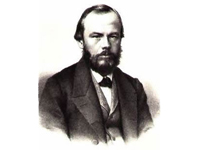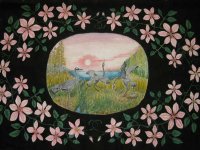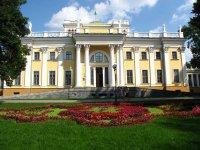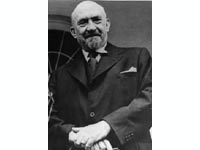Fyodor Mikhailovich Dostoevsky
Author: Lida added 26-08-2012, 22:45

Fyodor Dostoevsky - Russian novelist, journalist, short-story writer, whose psychological penetration into the human soul profoundly influenced the 20th century novel.
On his father’s side Dostoevsky is one of the branches of the genus Rtishchev, who were the beginners of the calculus of the Dostoevsky’s family history researchers believe. October 6, 1506, when Daniel I. Rtishchev received from Pinsk Prince Theodore Yaroslav granted charter "forever and for good" on the estate Polkotichi and part of the village in the Pinsk Dostoevo county. The village Dostoevo was located to the north-east of Pinsk, between the rivers Pina and Yaselda. Fyodor Mikhailovich’s ancestors owned more than one hundred years this estate. In the middle of XVII century, Dostoevskys left the family estate. Nowadays this is village of Dostoevo Ivanovo district, Brest region of Belarus.
Fyodor Dostoevsky was born in Moscow. He was the second son of a staff doctor at the Hospital for the Poor – later Dostoevsky's father acquired an estate and serfs. Dostoevsky was educated at home and at a private school. With his pious mother he made annual pilgrimages to the monastery of the Trinity and Saint Sergei. Shortly after her death in 1837, he was sent to St. Petersburg, where he entered the Academy for Military Engineers.
Dostoevsky was commissioned as a 2nd lieutenant in 1842 and next year he graduated as a War Ministry draftsman. He had no interest in military engineering but at the academy he could also study Russian and French literature. Soon he began translating books to earn some extra money.
Around the mid-1840s he wrote his first novel, Poor Folk, which brought him into the mainstream. In 1849 he was arrested for his involvement with the Petrashevsky Circle, a progressive discussion group. He and other members were condemned to death for their participation in this group, but the execution proved to be a mock execution at the last moment, and Dostoyevsky's sentence was commuted to four years of imprisonment in Siberia. After his release from prison he was forced to serve as a soldier, but was discharged from the military due to ill health and allowed to continue with his writing.
February 6, 1857 Dostoevsky married Maria Isaev in the Russian Orthodox Church in Kuznetsk.
The period of imprisonment and military service was a turning point in Dostoevsky's life: from the undecided in life, "the seeker of truth in man," he became a deeply religious man, the only ideal which the rest of his life was Christ.
In 1859, he was dismissed and returned first to the city of Tver, and then to St. Petersburg. Dostoevsky began to re-engage in literature. In the same year in "Notes of the Fatherland," published the story "Stepanchikovo village and its inhabitants" and "Uncle's Dream."
In 1861 his older brother, Mikhail Mikhailovich Dostoyevsky, began publishing a monthly literary magazine the big "Time", after the close of which two years later, the brothers began to publish the magazine "The Age". The pages of these magazines were such works of Dostoevsky as "The Insulted and Injured," "House of the Dead," "Winter Notes on Summer Impressions" and "Notes from the Underground." In the "House of the Dead" under false names Fyodor said his life in prison and described his former fellow-convicts.
Dostoevsky made a trip abroad, where in Baden-Baden became interested in a ruinous game of roulette, and had constant need of money. Unusual way of life completed the destruction of European socialist illusions of youth, formed a critical understanding of bourgeois values and the rejection of the West.
In 1866 after the death of his brother and his wife and cessation of publication of the magazine "The Age" Dostoevsky wrote the novel "Crime and Punishment."
In 1867 Dostoevsky married to Anna Snitkina, his stenographer, who became his close and devoted friend. Soon, they went abroad: lived in Germany, Switzerland and Italy. During these years the writer has worked on the novel "The Idiot" (1868) and "The Possessed" (1870), who finished already in Russia.
In May 1872 Dostoevsky went away for the summer from St. Petersburg to the Old Rusu, where later they bought a modest cottage and lived there with her two children, even in winter. In the Old Ruse written almost entirely novels "Teenager" (1874) and "The Brothers Karamazov" (1880).
In 1876 Dostoyevsky began publishing a monthly magazine under the original form of his "Diary," wrote the only one without his staff. This edition came out in 1876 and 1877 in number of 8,000 copies.
January 28 1881 - Fyodor Mikhailovich died.
Dostoevsky's work had a great influence on Russian and world culture. The writer's literary heritage in various ways evaluated both at home and abroad.
In the West, his work has had a significant effect on movements such as existentialism, expressionism and surrealism.
The memory of Fyodor Mikhailovich Dostoevsky is strong in today's Belarus. Since October 5-6, 2006 in the center of Ivanovo district, Brest region on the international scientific-practical conference on the 500th anniversary of the kind of Dostoevsky and the 185th anniversary of the birth of Fyodor Mikhailovich gathered scientists from 12 countries.
Donate:
















